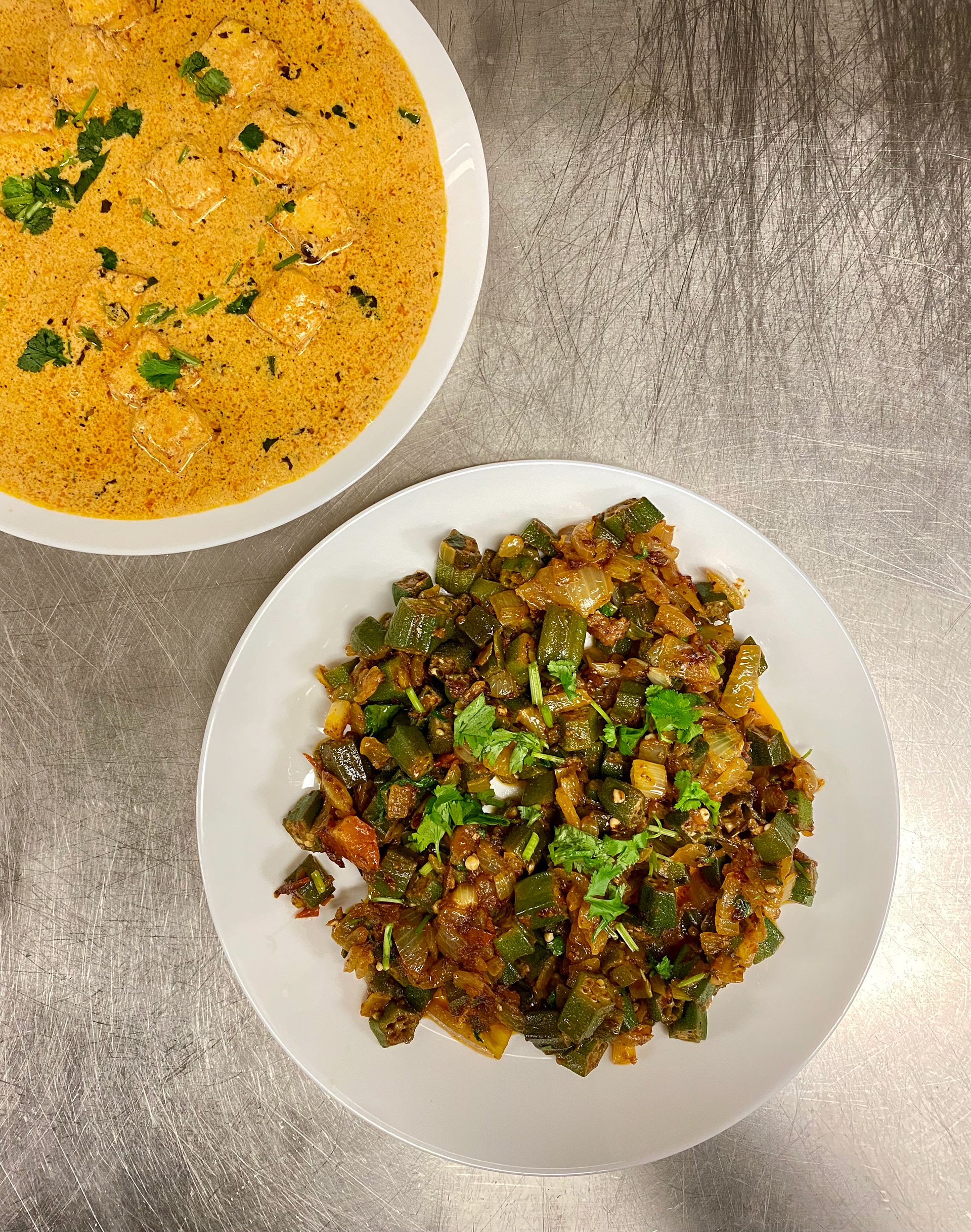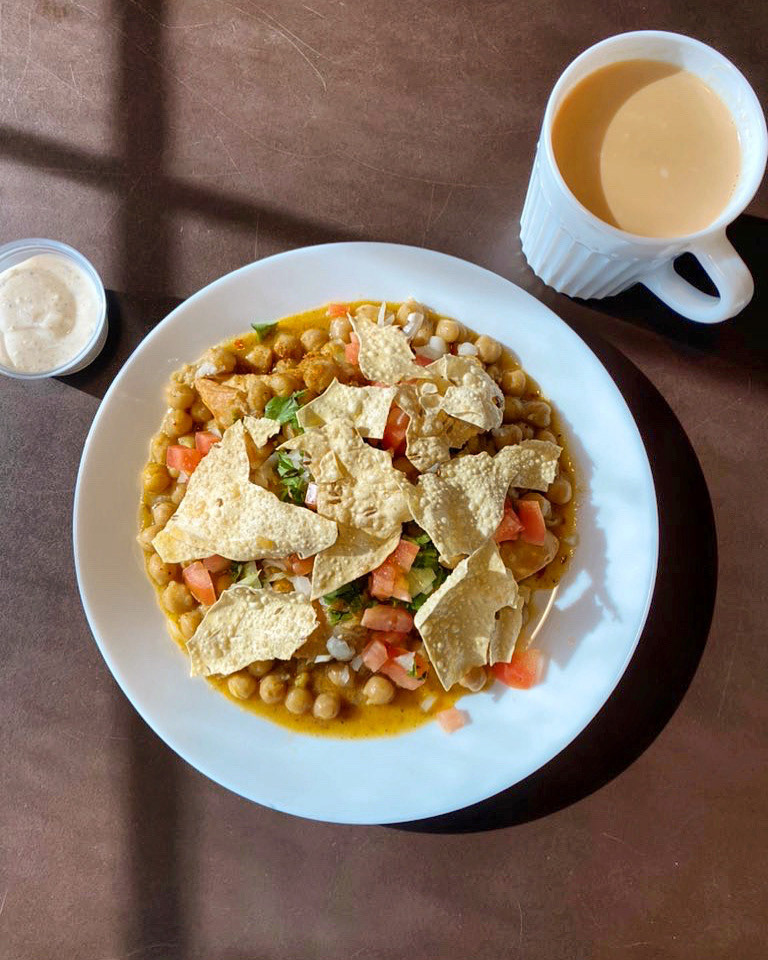Clockwise from top: Karela, naan, shaahi paneer, bhindi do pyaza and vegetable biryani.
If Yaar Khan and his wife Madiha Sultan argue about anything in the kitchen of their Fort Erie restaurant, it’s how much spice she puts in the food.
Khan can’t take the heat. Sultan?
“She’s like 20, not 10,” Khan said with a laugh.
“When I cook food, he stands over me. ‘Don’t put red pepper in,’ ” Sultan said, smiling. “He leaves and I add the pepper. I know how much is needed.”
Three years into running Niagara Tabaq, their Indian/Pakistani eatery tucked in the Flying J Travel Center on Pettit Road, Sultan has shown meal after meal that’s true.
What wasn’t an argument for them, however, was opening their 250-seat restaurant in 2018 with South Asian fare as the calling card at a highway rest stop that exists primarily for the 18-wheeling crowd.
In fact, it was a natural fit after mega-diner Denny’s vacated the space in 2017.
Khan had been managing the neighbouring gas station with his brother, a side hustle to his full-time job as a translator for the Canadian Border Services Agency’s refugee processing centre at the Peace Bridge.
When Denny’s packed up its populist menu, something was needed to feed the drivers of the 1,200 freighters pulling into the Flying J every day. The manager running the truck stop pointed out to Khan that more than half are of South Asian heritage.
Niagara Tabaq co-owner Yaar Khan with his tandoor that he and his wife Madiha Sultan use to make naan and other dishes at the restaurant.
A restaurant serving the likes of karela, dal channa, bhindi do pyaza, tandoori chicken, mutton karahi, and kabobs was a natural fit.
Even better that Sultan’s family ran restaurants back in the couple’s native Pakistan, where she had worked as a consultant for a refugee NGO and Khan served as a lawyer, politician and owned a law school in Islamabad before coming to Canada to provide the life they wanted for their six children.
And Sultan’s brother had been running a successful tabaq in Mississauga, so they could lean on him for help with theirs.
“We calculated that even (if) 30 per cent (of truckers ate here), the restaurant would be full,” Khan said.
So in March 2018, they opened Niagara Tabaq — tabaq meaning plate or dish in Arabic.
“It’s familiar to people,” Khan said about the name. “It’s a big plate. Everyone sits together and eats together. Everyone unites together to eat.”
Except their target audience.
When Niagara Tabaq opened, few of the South Asian truckers they figured the restaurant would appeal to came in for a meal, even with the couple printing off flyers in Hindi and Punjabi and sticking them to windshields.
It turned out most were short-haul drivers, their home base in the Greater Toronto Area. Most ate before hitting the road and timed their deliveries to this end of the QEW so they wouldn’t have to eat again en route.
Still, people came and not for the pasta, stir-fry or bacon and eggs on the menu for those missing the restaurant’s previous incarnation. They came for the samosa chaat, warm samosa topped with spiced chickpeas, the full chickens roasted in the tandoor, the karela (bitter melon) and bhindi (okra).
And they came from Fort Erie, where the couple focused their marketing efforts after trying to woo the truck drivers.
At the end of their first year in business, Khan and Sultan managed to save $100, bucking the 60 per cent failure rate of independent restaurants in their first year, pre-COVID.
“We were happy,” Khan said. “We were good at that time and then COVID (hit).”

Shaahi Paneer (top) and Bhindi do Pyaza.

Samosa chaat and a cup of masala chai.
Niagara Tabaq is still good — stellar, in fact — if less busy and doing only takeout until December, should they find staff to open more than Monday through Friday for dinner.
When I first ate here in August, ordering just about every vegetarian dish, accompanied by biryani and naan, my dining partner and I parked ourselves at the lone picnic table on the grounds. We swooned as we ate under the glow of gas station lights.
A repeat order only confirmed how special Niagara Tabaq and the food it serves are.
The karela, which I adore, didn’t bite back in its bitterness. The bhindi was cooked to bring out okra’s best and stifle its sometimes slippery mouthfeel. The dal channa, its yellow gravy flecked with red pepper, was indeed perfectly spiced by Sultan. And the aloo taree (spiced potatoes), vegetable biryani, and naan, baked until bubbling in the tandoor, were a holy trifecta of flavour-filled carbs to round out the meal.
“When I cook something and something good comes out, it feels good,” Sultan said. “Whenever I cook something, my kids are on my mind. Will they like it? With their feelings, I cook for everyone.”
All in, it makes Niagara Tabaq an essential stop on any route, four wheels or 18 carrying you to get there.
This isn’t fast food. Orders can take at least 30 minutes. Khan won’t let me write the reason why in this story. But the spoiler is neither he nor Sultan cut any corners. There is much manual labour that goes into each order that comes into the kitchen.
“It’s a little secret, but it’s our thing,” Khan said. “People who come here ask ‘What are you doing? Why is it different?’ ”
Given that 20 to 60 per cent of truck drivers in Canada identify as South Asian depending on the region, according to Statistics Canada, Khan and Sultan’s dream is to open a tabaq in Flying J’s farther from Toronto. That way, their target diner will have to eat on the road, and hopefully at one of their restaurants.
The pandemic has paused those plans, keeping the focus on Fort Erie. Still, they remain hopeful that if they cook it, the truckers will come here, too.
“This was a new experience for us but now we love it and we’re making it a proper profession,” Khan said. “Hopefully after COVID we will go back to our original plan. Let’s hope.”
This story originally appeared in the St. Catharines Standard.